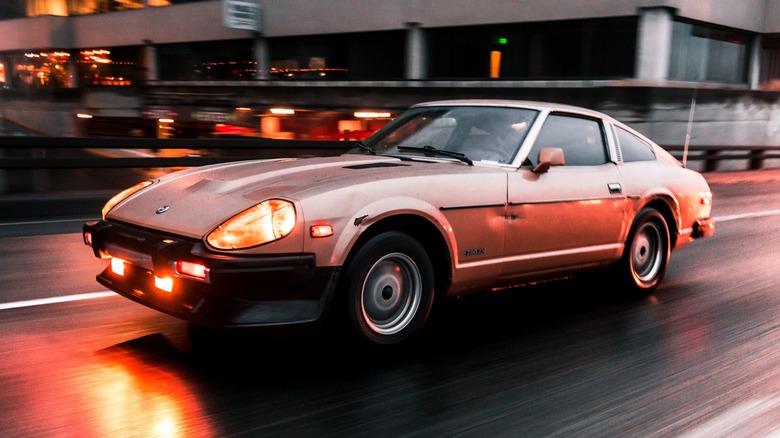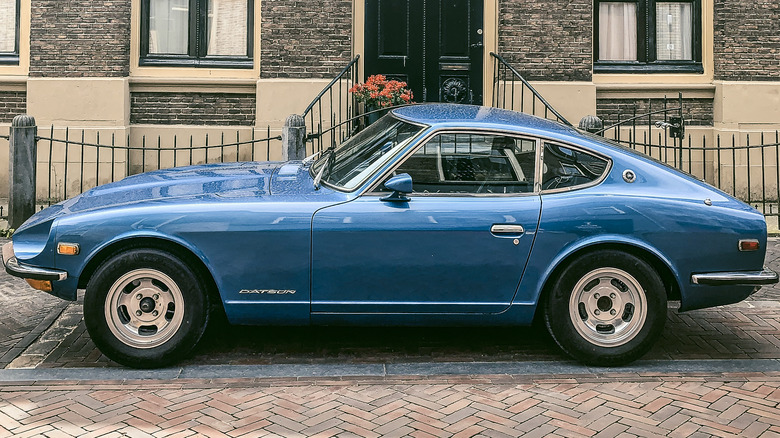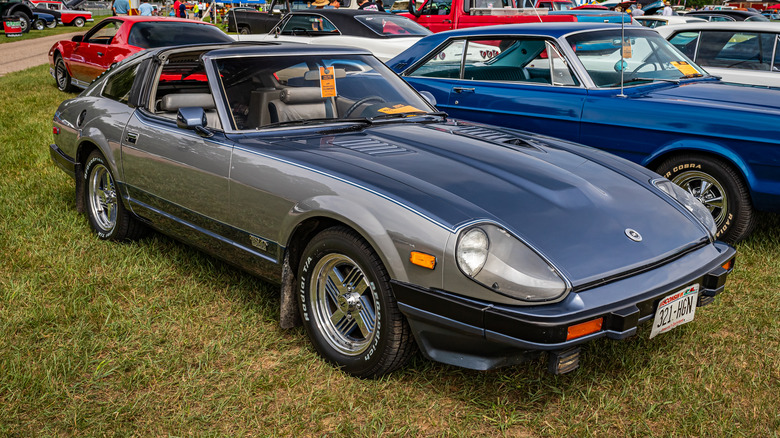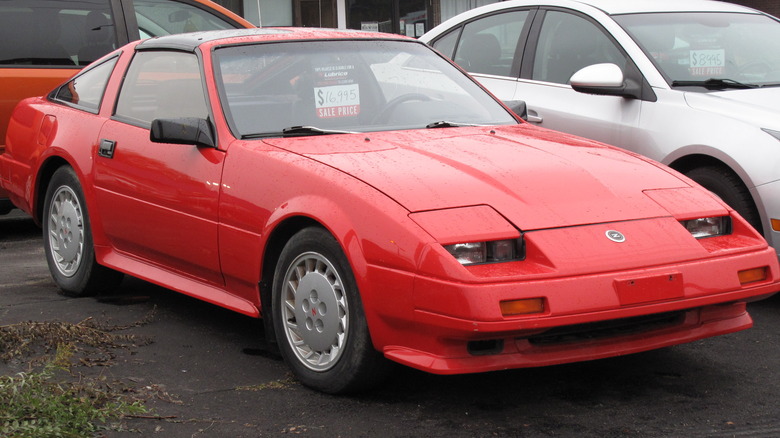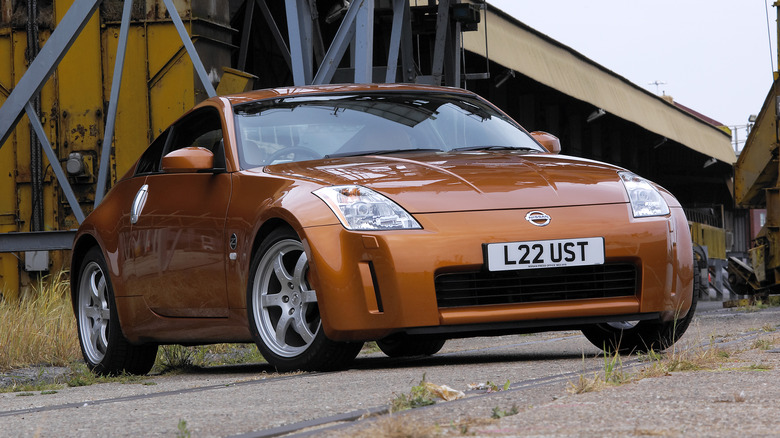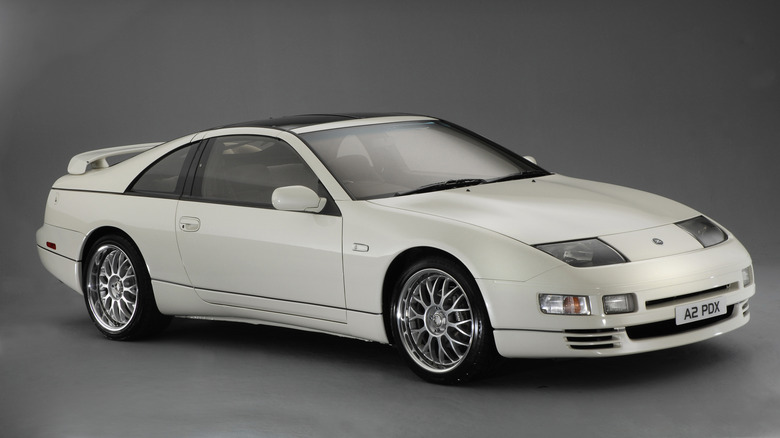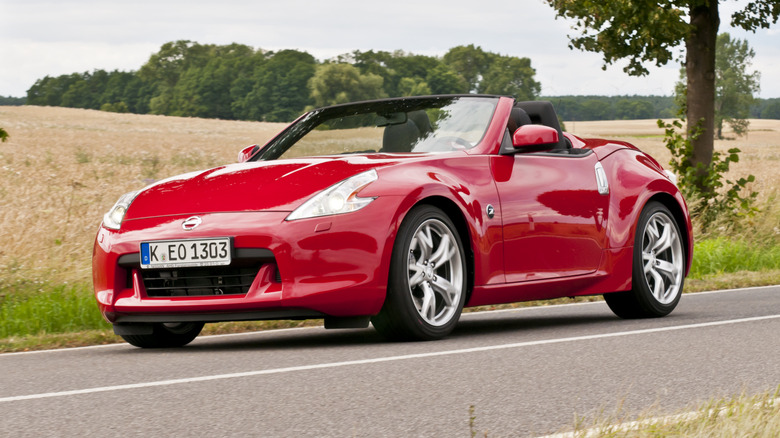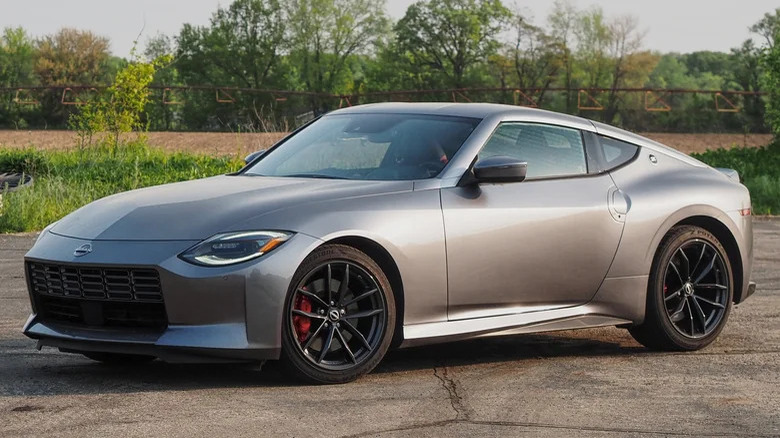Every Generation Of Nissan/Datsun Z Ranked Slowest To Fastest According To Driver Tests
There are few cars that can claim to have shaped the fortunes of an entire brand as much as the original Z-car. The 240Z proved that Nissan, and by extension, Japanese carmakers, could produce sports cars that could compete with the very best on the market, both in terms of performance and affordability. In the decades since the original Z launch, Nissan's sports car line has had plenty of highs and lows, but with the launch of the latest Z, it's returned to its roots as a straightforward yet highly appealing sports car.
With the myriad low-volume specials and iterative improvements made to each model over the decades, it's impossible to single one Z car as definitively the best. So, we've chosen to rank them from slowest to fastest off the line instead, using each generation's reported 0-60 mph times. It should be no surprise that the ranking is mostly chronological, although there's one generation that proved to be particularly ahead of its time in terms of its straight-line performance.
7. Datsun 240Z (1st gen) – 8.0 seconds
The original Z car debuted for the 1970 model year and was a huge hit, playing a key part in the brand's success in America. Its affordable starting price, excellent driving dynamics, and high build quality meant it could go toe-to-toe with domestically made cars costing far more -– although there were very few direct rivals for the 240Z to compete against. Although the Datsun was billed as more of a grand tourer than an all-out sports car, its 0-60 mph time was still respectable for the era, clocking in at around 8.0 seconds, according to Nissan of Rochester.
While the original iteration of the 240Z proved to be a bestseller, Nissan didn't rest on its laurels, unveiling the updated 260Z and then 280Z just a few years after the original car launched. Both sported larger engines and improved performance, although thanks to the original's iconic status, it's still the most highly desired among collectors today. As the supply of well-kept examples has dried up in recent years, prices for the most pristine cars have been on a slow but steady upward trend. However, there are still plenty of affordable examples left for now, even if the cheapest of those will need plenty of work before hitting the road again.
6. Datsun 280ZX (2nd gen) – 7.4 seconds
Following up on such an iconic car was always going to be a difficult task, and Nissan's second generation Z car wasn't so universally well received. In response to increasing competition in its largest markets, the automaker positioned the 280ZX as a luxury vehicle, focusing on its credentials as a plush daily driver more than its prowess as a sports car. It did sport mild performance improvements though, at least in top-spec form. The 0-60 mph time for the top-spec 280ZX Turbo sat at 7.4 seconds, according to MotorTrend. Base spec cars were considerably slower.
To make matters worse, the car wasn't particularly good in the corners and the added plush furnishings made it considerably heavier –- the nimble, lightweight feel of the 240Z was nowhere to be found here. While the 280ZX did find buyers, many were considerably different from the original 240Z's fans.
As such, many modern Z-car enthusiasts consider the 280ZX to be one of the worst generations, and thus it has remained a less collectible model than both its predecessor and more recent Z iterations.
5. Nissan 300ZX Z31 (3rd gen) – 7.1 seconds
The first of two Z-car generations to bear the 300ZX name, the Z31 could never shake off the "luxury" image of its predecessor. This was partly a deliberate move from Nissan, as the previous car was a consistently strong seller and bosses were reluctant to mess with the basic design too much for fear of alienating buyers. This is most evident in its styling but also partly in its performance — while it was faster than the outgoing car, it wasn't hugely so, with the 300ZX Turbo clocking a 0-60 mph time of 7.1 seconds, according to TFLCar.
Still, in top-spec form, it was one of the faster cars in its class at the time, and handling was improved over the old car, too. The 280ZX had introduced a focus on in-car technology, and that theme continued with the Z31, which boasted cutting-edge features like climate control, a g-meter, and cruise control. While it remained relatively successful in terms of sales, by the end of its production run, it was becoming increasingly dated compared to its rivals. A radical overhaul was needed, which came in the form of the Z32 300ZX.
[Featured image by Elise240SX via Wikimedia Commons | Cropped and scaled | CC BY-SA 4.0]
4. Nissan 350Z (5th gen) – 5.6 seconds
The Z32 was so quick it actually outshone the later 350Z in a straight line. The 350Z was no slouch, however –- it still delivered a respectable 5.6 second dash to 60 mph, as measured by Parkers. Anyway, it wasn't pitched as an all-out straight line monster. Rather, it was a back-to-basics sports car, following a similar blueprint to the original 240Z. It cut back the luxury and tech features that had become ubiquitous in previous generations, offering drivers an enticing combination of V6 power, top-tier handling, and Japanese build quality all for an attainable price.
After the Z line had spent a few years away, it was the reboot that enthusiasts wanted and the car proved to be both a commercial and critical hit. The oldest examples of the 350Z are likely hitting the bottom of their depreciation curves, making them an excellent option for anyone looking for an affordable Japanese sports car. However, like any older car, it's worth staying away from the cheapest examples unless you're looking for a long-term project.
3. Nissan 300ZX Z32 (4th gen) – 5.0 seconds
The 300ZX is one of the most feature-packed Z-cars ever made, boasting futuristic additions like four-wheel steering and multi-link suspension. It was also a world away from its predecessor in terms of its styling. Gone was the bloated, squared-off car of old, replaced by a proper sports car with sleek, flowing lines and a focus on aerodynamics. Performance was appropriately improved too, with Car and Driver achieving a 0-60 mph time in the 300ZX Turbo of five seconds flat.
Its cutting-edge systems made it stand out from the crowd at the time, but they also had two unfortunate side effects. One was that the Z32's pricing had increased to the point where it was no longer affordable for most enthusiasts, which resulted in declining sales towards the end of its production run. The other was that it was complex and costly to maintain, which put off used 300ZX buyers and kept resale values low for years. Those values are now improving, but even so, there are still plenty of things to watch out for when buying a used example of a 300ZX.
2. Nissan 370Z (6th gen) – 4.7 seconds
After the Z line was successfully resurrected with the 350Z, Nissan saw no reason to change the formula again, and so the 370Z was much like its predecessor. The RWD, V6-powered sports car featured updated exterior styling and some handling tweaks, but the basic appeal remained unchanged. Depending on who's asked, this is either a good or a bad thing -– some thought the lack of updates left it trailing behind fresher rivals, while others appreciated the old-school feel and familiarity of the car.
Performance was moderately improved over the 350Z, with MotorTrend clocking a best 0-60 mph time of 4.7 seconds after testing several variants of the car. Nonetheless, the extra power wasn't enough to tempt buyers towards the end of its life, and after several years of slipping sales the 370Z roadster was axed in 2019, with the coupe following shortly after. That left Z-car enthusiasts eagerly awaiting the 370Z's replacement, which was released for the 2023 model year after a string of teasers and previews.
1. Nissan Z (7th gen) – 4.3 seconds
Driving the 2023 Nissan Z will feel like a familiar experience to anyone with plenty of seat time in its predecessor, as improvements have mostly been iterative. Much like the 350Z, the Z's designers drew on the original 240Z for inspiration. The result is a car that packs plenty of grunt at an affordable price without the technological innovations that some fans expected from the new generation. In fact, the car's retro nature is actively championed by Nissan, with its styling taking cues from past models in the Z line.
Performance testing by MotorTrend put the car's 0-60 mph time around 4.3 seconds, making it comfortably the fastest Z yet –- although with 400 horsepower on tap from its V6 engine, that's little surprise. The 2023 Z's starting price just north of $40,000 makes it comfortably cheaper than rivals like the Toyota Supra or Porsche 718 Cayman, although the interior and refinement of both of those cars are arguably superior to the Z.
That said, Nissan's latest sports car makes a compelling case for itself in what's currently a very competitive market, although it remains to be seen whether it will be just as popular with buyers as previous generations.
